#British colonial legacy
Explore tagged Tumblr posts
Text
The Story Behind Naldehra: Origin and History of Shimla’s Iconic Destination
#British colonial legacy#British India—Lord Curzon#dense woods of Naldehra#Himachal Pradesh#lord Curzon#Lord George Curzon#Nag#Naldehra#Shimla#The Story Behind Naldehra#Viceroy of India from 1899 to 1905
0 notes
Text
british men of letters were so funny as a villain. like they were evil bc they had bad technology and they were british. maybe this was spn finally getting all that superwholock stuff off their chest.
#spn#supernatural#spn season 12#theyre haters who couldnt stand the legacy#so they made the big bad for that season british sci fi#or the legacy of british colonialism#but whatever#superwholock haters back off that includes you spn writers#superwholock
19 notes
·
View notes
Text
Been digging into things on Canadian/British, United States/British and South American/Spanish history recently and the notable thing that has come up on both - in all three cases, the European settlers were the ones actively engaging in genocide of the indigenous population. It was not the active policy of the European government.
In all three cases the European government actually passed protective legislation for the rights of indigenous subjects at the request of either indigenous people themselves travelling to Europe to make these representations, or not-entirely-awful Europeans passing on what was happening to them. They weren’t *incredible* protections in any of the three cases, but they at least recognised that indigenous people were *people* with actual basic rights. Like “not being automatically murdered or enslaved”.
But then European settlers went *batshit* at this legislation. The entire idea of “No Genocide” policies provoked enormous settler backlashes in all three cases. It was even a material, if not enormous, factor in why the US declared independence.
And the European governments in question just…rolled over. Made no real attempt to enforce this protective legislation. And it *certainly* was *not* why Britain sent in troops when the US declared independence. The Founding Fathers just viewed even the fact they had been *asked* to not murder indigenous people as an outrage.
None of this is to excuse European colonial states today of our responsibility to pay reparations and lobby for protections for indigenous people (and BIPOC in general) in our ex-colonial states. We’ve benefitted so much, especially on mass resource plundering, that reparations are a responsibility we cannot shirk.
(I just finished a biography of Charles Hapsburg and how he frittered away *massive* silver imports stolen from South America on European wars. That huge resource injection was pretty vital to the beginning of European international capitalism in the 16th-17th centuries. Before that, states just kept coming up against insufficient metals for currency, especially ones with the intermediate value of silver that let a critical mass of lower-level transactions happen.)
What it is, however, is an examination of the different ways states can be responsible for genocide, eugenics, and other crimes.
It does not need to be active policy for a state to be responsible. Even passing protective legislation doesn’t prevent a state’s responsibility if they don’t take measures to enforce that legislation, and, particularly, *if they give in to loud backlash from privileged parties who see it as an infringement of their privilege for people they are oppressing to be given some basic rights.*
I am not a proponent of “history repeats itself”. Context *always* matters, and every different situation has a different context. However, history itself provides an incredibly important and *necessary* context for situations we face now. And these facts are *incredibly* relevant to *many* situations we are currently facing.
#early modern history#colonialism#colonialist legacy#canadian history#us history#south american history#capitalist history#indigenous rights#indigenous people#spanish history#british history#nonenforcement of legislation makes it worse than useless#genocide#canadian genocide#south american genocide#american genocide#eugenics#corporate lobbying#privilege#settler colonialism#settler states#european history#european reparations#reparations
35 notes
·
View notes
Text
.
#lewis is for sure going to come out after he retires 🫶#the way he talks about lgbt rights and willing to die for it/being who you are etc#I know who you are you are who I am#there's this bitter irony that so many lgbt criminization is a direct result of british colonisation. thats what they exported to the world#from africa to asia this is colonial legacy that lives and harms to this day#anyways always major respect for lewis for repping 🏳️🌈 I respect him for it#this is actually a topic I have a lot of thoughts on but some of it is just too close to home
24 notes
·
View notes
Note
You will NEVER giess who this anon is....
This anon.... is not... throwing away her.... Shot....

sauteed.
#chat#theodosia writes me a letter every day im keeping her bed warm while her husband is away hes on the british side of georgia hes trying to ke#ep the colonies in line but he can keep all in georgia theodosia shes mine love doesn't discriminate between the sinners and the saints it t#akes and it takes and it takes and it takes and we keep loving anyway we laugh and we cry and we break and we make our mistakes and if there#s a reason im still by her side when so many have tried im willing to wait for it (wait for it) my grandfather was a fire and brimstone prea#cher but there are things that the homilies and hymns wont teach you my mother was a genius my father commanded respect when they died they#left no instructions just a legacy to protect death doesn't discriminate between the sinners and the saints it takes and it takes and it tak
1 note
·
View note
Text
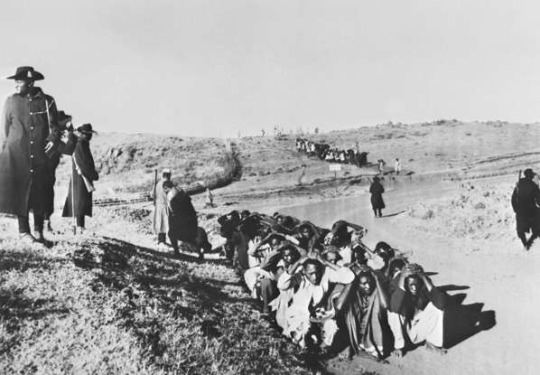
Though millions across the world mourned, many also saw the Queen’s passing as a bitter reminder of the British empire’s violent exploitation of countries throughout history, resulting in decades of economic and social devastation.

The death of Queen Elizabeth II revived longstanding criticism over the monarchy’s enrichment from the British empire’s violent colonization of African, Asian and Caribbean nations.

A lot of young Africans shared images and stories of their own elders, who endured a brutal period of British colonial history during the Queen's long reign.

Travel was restricted for Kenyans under British rule
"I cannot mourn," one wrote on Twitter, posting an image of what she said was her grandmother's "movement pass": a colonial document which prevented free travel for Kenyans under British rule in the east African country
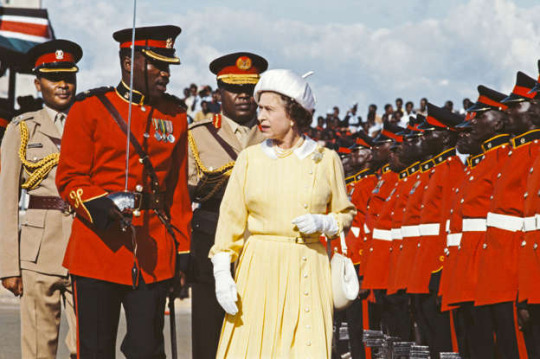
Men taken away from their families
Another wrote that her grandmother used to narrate to them how they were beaten and how their husbands were taken away from them and they were left to support their children alone during colonial times.

Cruelty and economic deprivation
Karen Attiah, an African-American journalist tweeted: “Black and brown people around the world who were subject to horrendous cruelties and economic deprivation under British colonialism are allowed to have feelings about Queen Elizabeth”.
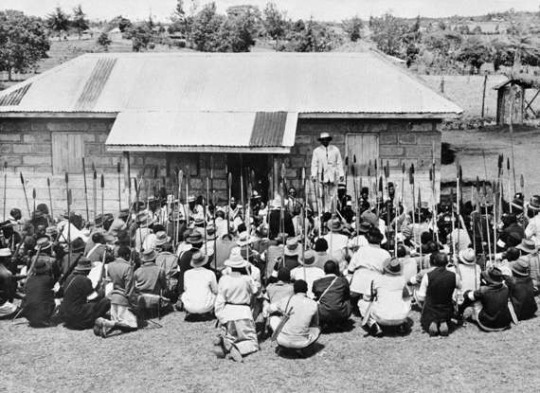
Decades of violent upheaval
Harvard University history professor Maya Jasanoff wrote in the New York Times that the Queen’s stoic presence in life as a “fixture of stability” underlied a “solid traditionalist front over decades of violent upheaval”.

The Mau Mau uprising
Jasanoff pointed out that months after Elizabeth II learned of her father’s death and became queen, British colonial authorities in Kenya suppressed a rebellion against the colonial regime known as Mau Mau.

No apologies from the Queen
Cornell University professor Mukoma Wa Ngugi pointed out on Twitter the Queen never apologized for slavery or colonialism or urged the crown to offer reparations for “the millions of lives taken in her/their names.”
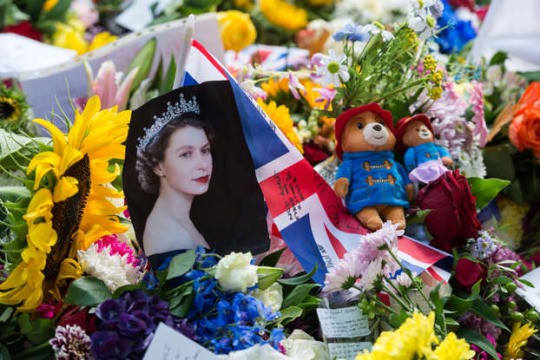
An “absurd theater”
“As a Kenyan, I feel nothing. This theater is absurd”, Wa Ngugi added.
The British monarchy represents inequality
University of Cambridge postcolonial studies professor Priyamvada Gopal said on Democracy Now news broadcast that the British monarchy has come to represent “profound and grave inequality”.
Parallels between the British monarchy and the US
She drew parallels between the British monarchy and the concentration of power in other places like the United States.

Colonization of Puerto Rico
Before its independence, the US was once ruled by the British monarchy and now effectively colonizes Puerto Rico and other island nations.
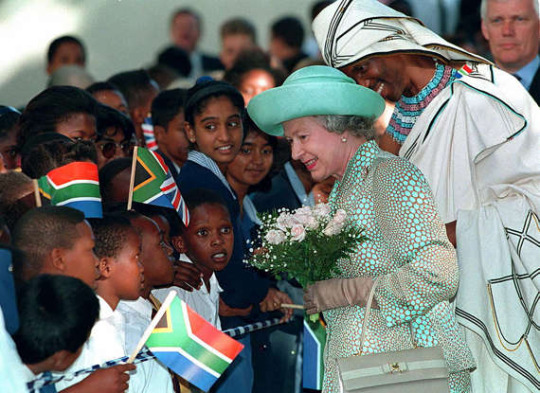
Concentration of power
Gopal added that “power, privilege and wealth are in the hands of a few, which the rest of us are then invited to worship and think of as perfectly normal”.
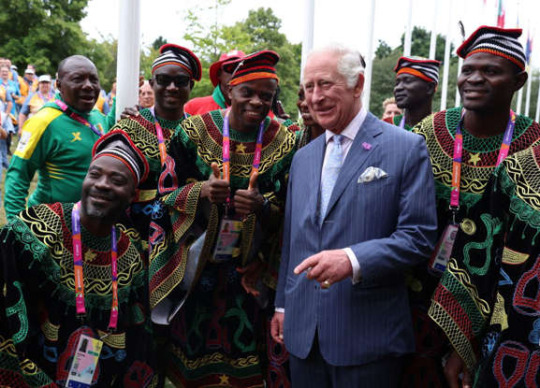
The future of the Commonwealth
Melissa Murray, a law professor at New York University whose family is from Jamaica, tweeted that the Queen’s death would “accelerate debates about colonialism, reparations, and the future of the Commonwealth”.
Head of state for 32 countries
The Queen was head of state for as many as 32 countries in her 70-year reign, but by the time of her death, just 14 other than the UK remained.
Change underway
While Barbados’ decision to become a republic last year was the first such exit in almost 30 years, the accession of Charles III has many of his subjects across the Commonwealth asking if the time is right to install a less remote head of state.
Antigua and Barbuda
Gaston Browne (pictured), Prime Minister of Antigua and Barbuda, said on Saturday that his plan for a referendum was not an act of hostility, but “the final step to complete that circle of independence”.
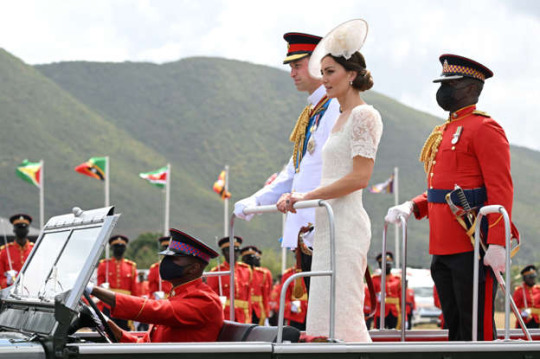
Jamaica
The removal of the monarchy appears more straightforward in Jamaica, where a simple majority would be enough, a threshold which polls have indicated would probably be met.
Independence for Jamaica
The prime minister, Andrew Holness (pictured), told William and Kate last year that Jamaica intended to be “an independent, developed, and prosperous country”.
Saint Vincent and the Grenadines
In Saint Vincent and the Grenadines, where protesters called for slave trade reparations during William and Kate’s visit, the prime minister, Ralph Gonsalves, proposed a referendum in July but said it could only go ahead with bipartisan support.
Possible change in the Caribbean
The Bahamas, Saint Kitts and Nevis and Saint Lucia all require a simple majority, while Grenada requires a two-thirds vote.

Racism in the royal family
While the Queen’s role in colonialism continues to gnaw at many, the latest generation focused on the racism that stems from the royal family.
The first mixed-race royal member
Particularly through the Queen’s relationship with her mixed-race daughter-in-law Meghan Markle.
Meghan Markle’s accusations
In 2021, Meghan Markle, said in an interview with Oprah Winfrey that “someone” in the royal family had expressed concern about her child’s skin color.

Ethnic minorities were banned from office roles at Buckingham Palace
Shortly after, a set of documents discovered at the National Archives by The Guardian, revealed that the Queen banned “coloured immigrants or foreigners” from serving in office roles in the royal household.
Ethnic minorities were only allowed servant roles
This racist rule was in place until, at least, the late sixties. However, ethnic minorities were always allowed to work as servants.
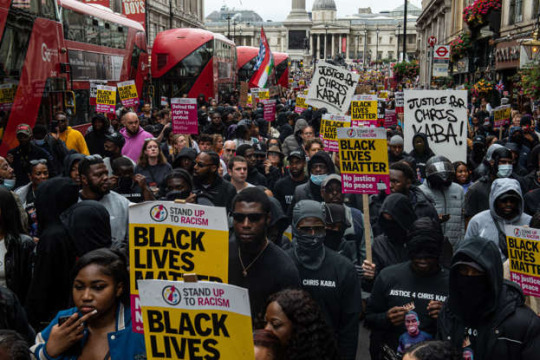
No response to the BLM movement
Furthermore, a year before, people in the UK and everywhere, complained that the Buckingham Palace had no official response to the murder of George Floyd and the global Black Lives Matter Movement.
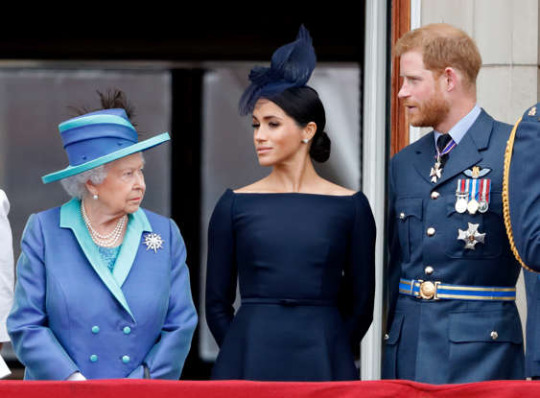
The Queen failed to address racism
“It’s hard to imagine the Queen showing support for BLM and anti-racism in general”, wrote a journalist for Insider in 2021.
Racism in the institution of the royal family
“In her 69 years on the throne, she has failed to address the racism that undeniably exists in the institution of the royal family,” she noted.
#white supremacy#england#british racism#elizabeth#charles#The dark legacy of Queen Elizabeth: a look at the monarchy's colonial past#Kenya#MauMau#caribbean#colonialization
5 notes
·
View notes
Photo
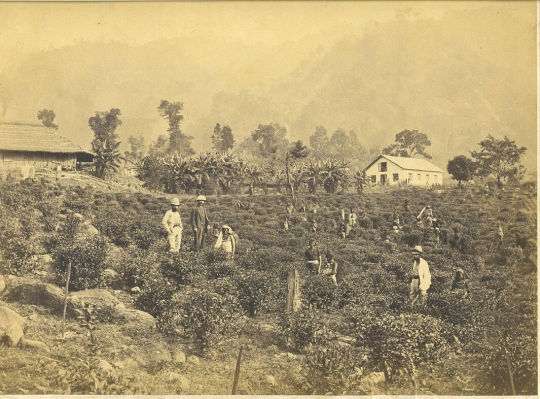
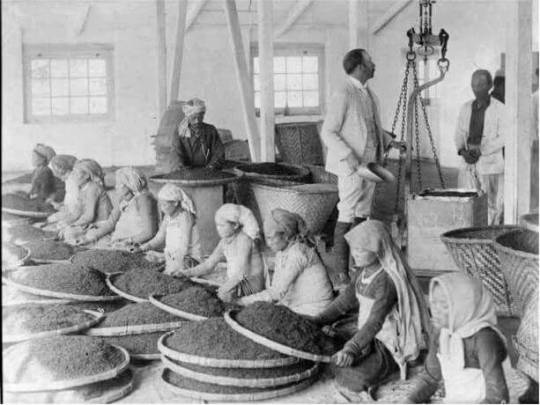
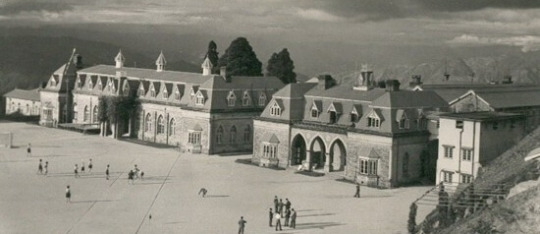

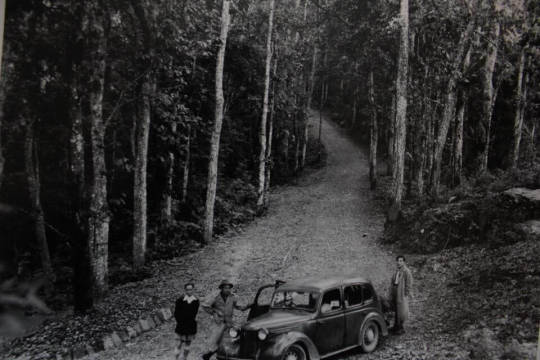
(via Role of the British in the Darjeeling hill station)
Learn about the rich history of Darjeeling as a hill station and sanatorium for the British during colonial times. Discover how the British pioneers were attracted to Darjeeling's lofty mountains with snow-covered peaks, bracing climate, and magnificent forests, which prompted them to establish a sanatorium and market there. Establishing a sanatorium and immigration led to the growth of employment opportunities and population. The article also delves into the tea plantation industry and the British educational legacy sustained in the Darjeeling hills. Additionally, the article provides insights into the development of transport and communication systems, such as the Darjeeling Himalayan Railway and Ropeways, which played a crucial role in economic progress in the region.
Read more by following the link-
https://darjeelingheritage.com/role-of-the-british-in-the-darjeeling-hills/
#darjeeling#hillstation#history#himalayas#british#legacy#tea#heritage#travel#sanatorium#railway#forests#colonial
1 note
·
View note
Text
1948 Riots which triggered Ghana’s independence - Ghanaian Museum
From the article;
'Veterans of world war two, who had fought with the Gold Coast Regiment of the Royal West African Frontier Force, organised a peaceful demonstration marching to Christiansborg Castle, Accra, Gold Coast (Ghana), to hand in a petition to the colonial governor, demanding that they receive end of war benefits and pay which they had been promised.
As they marched towards the Governor’s residence at the Christianborg Castle in Osu, the colonial police stopped them. The British head of police, Superintendent Imray, ordered his officers to shoot at the protesters, but they shot in the air.
Imray, who was getting frustrated, grabbed a gun from one of the officers and shot into the crowd, killing three of the ex-servicemen – Sergeant Adjetey, Corporal Attipoe and Private Odartey Lamptey.
Some other protesters suffered varying degrees of injuries.
Angered by this unwarranted violence, against unarmed men, and continued injustices suffered by the population in general, people in Accra and other towns and cities took to the streets, attacking European and Asian businesses and property.
Aftermath of the Riots
The 1948 riots lasted five days. By 1st March, the colonial governor had declared a state of emergency and put in place a new Riot Act.
On 12th March the governor ordered the arrest of “The Big Six,” leading members of the UGCC, which included Kwame Nkrumah, as he believed they were responsible for orchestrating the disturbances.
The Big Six were incarcerated in remote northern parts of the country. They were detained but released a month later.
A year later, Kwame Nkrumah broke away from the UGCC and formed his own party – the Convention People’s Party (CPP) With the party’s motto of “self-government now” and other activities, the party won the admiration of many voters.
The 1948 riots marked a turning point in the political history of Ghana. In March 1957, less than a decade after the 1948 riots, Ghana gained her independence.'
#ghana history#british history#ww2#colonial legacies#imperialism#british imperialism#ghana independence#commonwealth soldiers
1 note
·
View note
Text
Since the early days of British involvement with Zionism, Churchill sanctioned the dispossession of non-Jewish Palestinians by assuring that they have no voice in the affairs of their own land. “In the interests of the Zionist policy,” he stated in August 1921 as the government minister in charge of Britain’s colonies, “all elective institutions have so far been refused to the Arabs.”
A snapshot of Churchill’s stances on Palestine and race is found in the records of the 1937 Peel Commission hearings, convened to address a major revolt in Palestine. [...]
Horace Rumbold [...] asked whether Zionist policy is worth “the lives of our men, and so on.” And did it follow, he asked Churchill, that having “conquered Palestine we can dispose of it as we like?”
Churchill replied to that and similar questions by invoking commitments given when Britain captured Palestine toward the end of 1917. “We decided in the process of conquest of [Palestine] to make certain pledges to the Jews,” Churchill said.
Apparently skeptical, the head of the commission, William Peel, asked Churchill if it is not “a very odd self-government” when “it is only when the Jews are a majority that we can have it.”
Churchill responded with a blunt argument of might: “We have every right to strike hard in support of our authority.”
The historian Reginald Coupland nonetheless told the hearings that the “average Englishman” would wonder why the Arabs were being denied self-government, and why we had “to go on shooting the Arabs down because of keeping his promise to the Jews.”
Peel, similarly, asked Churchill if the British public “might get rather tired and rather inquisitive if every two or three years there was a sort of campaign against the Arabs and we sent out troops and shot them down? They would begin to enquire, ‘Why is it done? What is the fault of these people?… Why are you doing it? In order to get a home for the Jews?’”
“And it would mean rather brutal methods,” added Laurie Hammond, who had worked with the British colonial administration in India. “I do not say the methods of the Italians at Addis Ababa,” referring to Benito Mussolini’s Ethiopian massacre of February 1937, “but it would mean the blowing up of villages and that sort of thing?” The British, he recalled, had blown up part of the Palestinian port city of Jaffa.
Peel agreed, and added that “they blew up a lot of [Palestinian] houses all over the place in order to awe the population. I have seen photographs of these things going up in the air.”
But when Peel questioned whether “it is not only a question of being strong enough,” but of “downing” the Arabs who simply wanted to remain in their own country, Churchill lost patience.
“I do not admit that the dog in the manger has the final right to the manger,” he countered, “even though he may have lain there for a very long time.” He denied that “a great wrong has been done to the Red Indians of America, or the Black people of Australia,” by their replacement with “a higher grade race.”
#churchill explicitly compared what was being done to palestinians as equivalent to what was done to indigenous populations in aus and us#heard it on the podcast episode and looked it up#zionism#palestine
1K notes
·
View notes
Text
another annoying fake hypocrisy dunk ive been seeing a lot is some horrible nationalist propaganda account spouts some great replacement shit, but they're also british, so the QTs are like "oough, pretty ironic that a colonial power is complaining about being invaded" and my issue is twofold
immigration isn't actually comparable to the legacy of colonialism, i think. like it isn't comeuppance for like, genocide? hot take i guess
this isn't hypocrisy, they think their culture is better and they have more of a right to "invade" than their racist mental conglomeration of africa and the middle east does. it's internally consistent, please have an opinion for once in your life.
841 notes
·
View notes
Text
why do French people take themselves so fucking seriously like I have never met a more culturally butthurt group of people in my fucking life. I’d maybe get being so sensitive about preservation of your “language and culture” if you were like the Greeks and you’d spent 500 years under Ottoman rule and had the British holding some of your most culturally significant artifacts hostage. but you’re not Greek, you’re French, you were a massive colonial power and you still hold overseas territories, there are 274 million French speakers worldwide because you brutalized 1/3rd of the planet. your cultural legacy is surrendering during wars, pissing in Parisian streets, arguing, sleeping with people’s wives and eating snails. those practices are not on the brink of extinction
2K notes
·
View notes
Text
One of the major legacies of the British control of India was the planting of peoples of Indian origin all over the British Empire, including Britain itself. India was considered to be a reservoir of cheap labour. After African slavery was legally ended in 1833, ‘indentured’ labourers were recruited from India to work on plantations in Mauritius, Guyana, Trinidad, and Jamaica. This was slavery in a new guise: many laboured under conditions no less degrading than slavery. Thereafter wherever need arose, Indian labour was employed. Indians worked in the plantations and mines in Ceylon, Malaya, Burma, South Africa and Fiji. Indian labour provided the manpower to build the East African Railway. Indian sailors worked the British merchant navy. Indian soldiers not only helped to maintain the British Raj in India, but were used as cannon fodder overseas in colonial wars of conquest to extend its frontiers.
Indians were brought to Britain too. They did not come as ‘indentured’ labourers, but the principle of cheap labour applied here as well. Many Indian servants and ayahs (nannies or ladies’ maids) were brought over by British families returning from India. Indian sailors were employed by the East India Company to work on its ships. Some of these servants and sailors settled permanently in Britain.
One of the results of the policy of introducing western education in India was that, from about the middle of the nineteenth century, many Indian students began arriving in Britain, some on scholarships, to study law or medicine or to prepare for other professions. Some came to take the examination for entry into the Indian civil service since this examination could only be taken in London. Some Indian students settled in Britain after qualifying, to practise as doctors, lawyers or in other professions. Some Indian business firms opened branches in England. Nationalist politicians came to London, the centre of power, to argue the cause of Indian freedom. Indian princes and maharajahs visited England, not only as guests of the Crown on formal occasions, like the coronations, but also to pay their ‘respects’ to the monarch or for pleasure. London, as the metropolitan capital, attracted many visitors from India. Exhibitions of Indian arts and crafts were displayed in England too. The Asian presence in Britain therefore goes a long way back and forms a prelude to the post-independence migration of Asians to Britain.
— Rozina Visram, Ayahs, Lascars and Princes: Indians in Britain, 1700-1947 (London: 1986), pp. 9-10.
158 notes
·
View notes
Text
British ships carrying plants and seeds from around the world arrived in Botany Bay on January 20 1788. This story is overshadowed by convict ships and Royal Navy vessels, but the cargo on board also had a lasting impact. Colonists, convicts and Indigenous Australians were all affected [...]. Some of these plants [...] were food sources [...]. Others were attempts to expand the British Empire. Could the new territory be exploited as a tropical plantation? In the parliamentary debate over destinations for convict transportation [considering potential locations for sending prisoners], Sir Joseph Banks and James Matra, both members of James Cook’s 1770 expedition [to the South Pacific], spruiked the potential of the new colony as an extension of the empire. Matra claimed the colony was “fitted for production” of “sugar-cane, tea, coffee, silk, cotton, indigo and tobacco”. Banks claimed Botany Bay was an “advantageous” site, with fertile soil [...].
Two plants carried by the First Fleet stand out as examples of botanical imperialism: prickly pear cactus (Opuntia) and sugarcane.
Banks, as head of the Royal Society of London [and as a close adviser to King George, and also as a plant-collecting botanist who turned the Royal Botanic Gardens at Kew in London into the world's leading botanical garden], selected these species as experiments to compete with European trade rivals. His goal was to break a Spanish monopoly in producing fabric dye and to expand British cultivation of sugar outside the West Indies.
Prickly pear cactus was imported because it is the preferred food of the cochineal insect.
Dried cochineal were crushed to make a vibrant, colourfast scarlet dye for textiles. Discovered in the New World by Spanish colonists, cochineal replaced kermes, another insect that had provided red dye since antiquity. Cochineal dye was ten times stronger than kermes or vegetable dyes.
From cardinals’ capes to British officers’ red coats, cochineal was a product for elite consumers signifying power, wealth and prestige.
New Spain, based in Mexico, had a monopoly on cochineal. Banks wanted to break the stranglehold on the scarlet dye by establishing production in New South Wales.
Plants infested with the precious insects were imported from Brazil in 1788. The project soon failed when the cochineal died, but the cacti survived. Colonists used cacti as natural fences and drought-resistant animal fodder.
Without insects to feed on them the plants spread, uncontrolled, to cover more than 60 million acres of eastern Australia by the 1920s. Poison, crushing and fire failed to stop the cactus. [...] Opuntia cacti remain an environmental hazard. [...] The roots of these early imperial projects are deeply embedded in Australian culture and history, with an enduring legacy.
---
All text above by: Garritt C. Van Dyk. "The botanical imperialism of weeds and crops: how alien plant species on the First Fleet changed Australia". The Conversation. 25 January 2024. [Some paragraph breaks/contractions added by me. Italicized text within brackets added by me for clarity and context.
#multispecies#tidalectics#ecology#archipelagic thinking#prickly pear in australia#british imperial forestry#ecologies#indigenous#indigenous pedagogies#black methodologies
438 notes
·
View notes
Text
ALL YOU NEED TO KNOW ABOUT THE HEAD OF OBA
THE BENIN KINGDOM
THE LOOTED TREASURES BY THE BRITISH EMPIRE
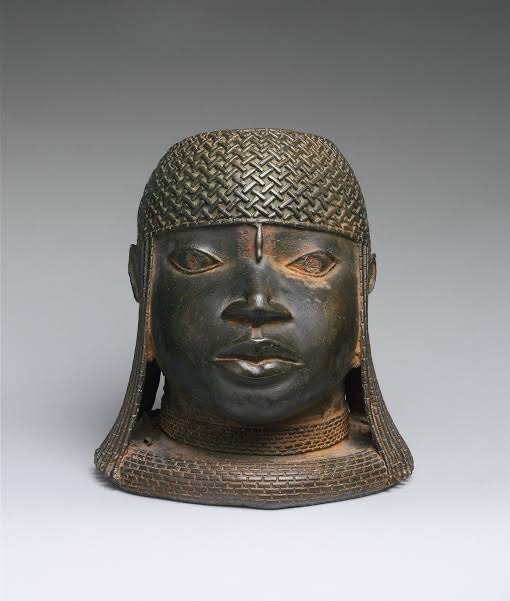
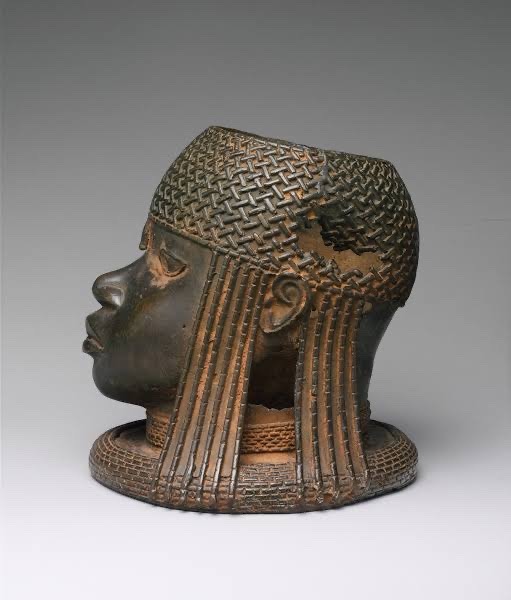
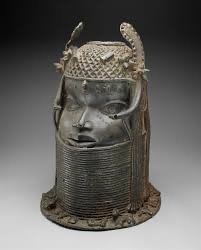
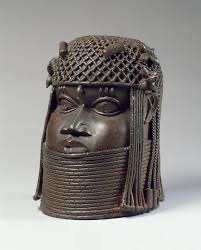
BLACK HISTORY IS DEEPER THAN SLAVE TRADE
The head sculptures of the Oba of Benin, also known as the Benin Bronzes, are a collection of intricate bronze and brass sculptures created by the Edo people of Nigeria. These sculptures typically depict the reigning Oba (king) of the Benin Empire and were produced over several centuries, with some dating back to the 13th century.
They are renowned for their artistic and historical significance, representing the cultural heritage and power of the Benin Kingdom. These sculptures often portray the Oba wearing coral beaded regalia, symbolizing his divine status and authority.
Many of these artifacts were taken from Benin during the late 19th century by British colonial forces, and they are now scattered in museums and private collections worldwide. There have been ongoing discussions and negotiations regarding their repatriation to Nigeria to restore their cultural heritage.
The head sculptures of the Oba of Benin remain a testament to the rich artistic and historical legacy of the Edo people and the Benin Kingdom.
HOW THE BRITISH STOLE FROM THE EDO TRIBE
1. British Punitive Expedition: In 1897, a British expedition, led by British officials and soldiers, was sent to the Benin Kingdom (in what is now Nigeria) with the stated objective of punishing the Oba of Benin, Oba Ovonramwen, for resisting British influence and trade in the region.
2. Sacking of the Royal Palace: During the expedition, the British forces entered the royal palace in Benin City, where many of these intricate bronze and brass sculptures were housed. The palace was looted, and numerous artifacts, including the Benin Bronzes, were taken.
3. Confiscation and Dispersal: The looted artifacts were then confiscated by the British authorities and later distributed to various individuals, museums, and institutions. Many of these artworks ended up in European museums and private collections.
The theft of the Benin Bronzes remains a contentious issue, as these artworks are considered cultural treasures of the Edo people and Nigeria as a whole. There have been ongoing discussions and demands for the repatriation of these artifacts to Nigeria, which has gained momentum in recent years as part of broader efforts to address historical injustices related to colonial-era looting.
The head sculptures of the Oba of Benin, like many traditional African artworks, hold deep symbolic significance within the context of the Benin Kingdom and its culture. Here are some of the key symbols and meanings associated with these sculptures:
1. Royal Authority: The Oba's head sculptures symbolize the authority and divine status of the reigning monarch, who was regarded as a sacred figure in Benin society. The elaborate regalia, such as coral beads and headdresses, worn by the Oba in these sculptures signifies his royal and spiritual power.
2. Ancestral Connections: The sculptures often depict the Oba with distinctive facial scarification patterns and detailed facial features. These features can represent specific ancestors or dynastic connections, emphasizing the Oba's lineage and connection to past rulers.
3. Historical Record: The sculptures also serve as historical records, documenting the appearance and regalia of the Oba during their reigns. This provides valuable insights into the history and evolution of the Benin Kingdom over the centuries.
4. Spiritual Protection: Some sculptures may incorporate elements like beads and cowrie shells, which were believed to have protective and spiritual qualities. These elements were worn by the Oba not only for their aesthetic value but also for their symbolic protection.
5. Cultural Identity: Beyond their specific symbolic meanings, the head sculptures are integral to the cultural identity of the Edo people and the Benin Kingdom. They represent the rich artistic traditions and heritage of the kingdom and its rulers.
It's important to note that the symbolism of these sculptures is deeply rooted in the cultural and historical context of the Benin Kingdom, and their interpretation can vary among different individuals and communities.
#life#animals#culture#aesthetic#black history#history#blm blacklivesmatter#anime and manga#architecture#black community#black heritage
827 notes
·
View notes
Text
Queen Yaa Asantewaa
How did a determined queen lead her people in a bold stand against colonial forces? Discover the inspiring story of Queen Yaa Asantewaa, the fierce leader who became a symbol of resistance in the fight for Ashanti independence. Born in 1840, Yaa Asantewaa was a queen mother of the Ashanti Empire in present-day Ghana. When British colonial forces exiled the Ashanti king and demanded the sacred Golden Stool, symbolizing the Ashanti nation’s soul, Yaa Asantewaa rose to defend her people. In 1900, she led the Ashanti in the War of the Golden Stool, rallying her people with powerful speeches that ignited their resolve to resist. As a commander, she organized and led her forces in a fierce battle against the British, who were stunned by her leadership and the strength of Ashanti resistance. Though the Ashanti eventually faced defeat and Yaa Asantewaa was exiled, her bravery and defiance left a lasting legacy as a symbol of resistance against oppression.
Follow @authentic_african for daily posts on African News, History, and Pop Culture
#yaa asantewaa#Ghana#african#afrakan#kemetic dreams#africans#brownskin#brown skin#afrakans#african culture#afrakan spirituality#epic video
56 notes
·
View notes
Text
With this read through of Dunbar-Ortiz’s book, I was completely blown away, and radicalized all the more. I unlearned so many intentionally confusing myths about what America is and how it came to be within the book’s 300 pages.
I came to understand that this is a country created by settler militias, not by immigrants, and that moral culpability for the harm done by the U.S. goes a lot farther than just a handful of wealthy slave-owners and especially badly behaved soldiers.
I learned about how the U.S. government’s political repression of Native peoples set a legal precedent that would one day be used to justify the torture of suspected “terrorists” at Guantanamo Bay and in Abu Ghraib. I saw more parallels between the violent settlement of the U.S. and of Israel than ever.
More than anything, Dunbar-Ortiz’ book taught me that the colonization of the United States relied upon the committing of several key sins — uniquely cruel political and military innovations that would reverberate forward throughout history, changing everything about how warfare is conducted and how oppressed peoples are exploited across the globe.
The fundamental sins of American conquest are: gun “rights”, private property, factionalism, and irregular warfare against “unlawful enemy combatants.” In this piece, I will discuss where each of these sins came from, why they were so essential to a successful Indigenous genocide, and the legacy we continue to see from them today:
Gun “Rights”
As an American, I had grown up being taught that the “well regulated militias” of the Second Amendment had arisen to fight off the British soldiers during the war of independence.
Under this version of United States history, citizens retain the right to own guns so that we might defend our property from criminals, protect “our” territories against foreign invasions, and resist tyranny from federal government. To this day, Americans evoke this interpretation of the Second Amendment as a justification for concealed carry rights, and for “castle doctrine” laws that allow home owners to shoot intruders (even unarmed ones!) inside their homes.
In reality, the militias mentioned in the Second Amendment had formed many decades before the revolution, and were initially created to slaughter Indigenous people and clear them out from their lands. The foreign “invaders” that the Second Amendment was created to defend against were not the British colonizers, but the many Native peoples who had been living on Turtle Island for thousands of years before European conquest.
Dunbar-Ortiz writes:
“…Native peoples are implied in the Second Amendment.
Male settlers had been required in the colonies to serve in militias during their lifetimes for the purpose of raiding and razing Indigenous communities, the southern colonies included, and later states’ militias were used as “slave patrols.”
The Second Amendment, ratified in 1791, enshrined these irregular forces into law: ‘A well regulated Militia, being necessary to the security of a free State, the right of the people to keep and bear Arms, shall not be infringed.’”
Full essay is free to read or listen to at drdevonprice.substack.com
89 notes
·
View notes